Author:
Damon Young
(MENAFN- The Conversation) 'Do you trust me?' An earnest question.
'I do.' An earnest answer.
And then that ancient, global gesture of earnest intimacy: a handshake.
For many, this is the moment from the Avengers: Endgame movie: Captain America and Iron Man putting aside their conflict for the common good. Tony Stark asks, Steve Rogers answers – and the Marvel Cinematic Universe is made whole.
After three years of conveniently aggressive animosity, these Avengers are once again allies. Instead of punching or shooting at each other, the two superheroes look into one another's eyes — and touch.
I confess that, for all my weary cynicism, I was moved as I watched this scene. Both times I watched it. And again, as my children and I saw it together. But why?
There is spectacle, of course. The protagonists must sprint faster than cars, punch through walls, swing off buildings, shoot rockets from their shoulders. There must be explosions and cosmic ripples and glowing pulses and beings turning to dust and so on. The studios cannot make back their production and advertising costs – perhaps more than half a billion US dollars (A$746 million) in this case – with a quiet seminar on Aristotle or Confucius.
Still, the digital marvels are not enough to move me or to keep me returning for the next episode, in perpetuity. For the franchise to profit as it does, the violence has to mean something more.
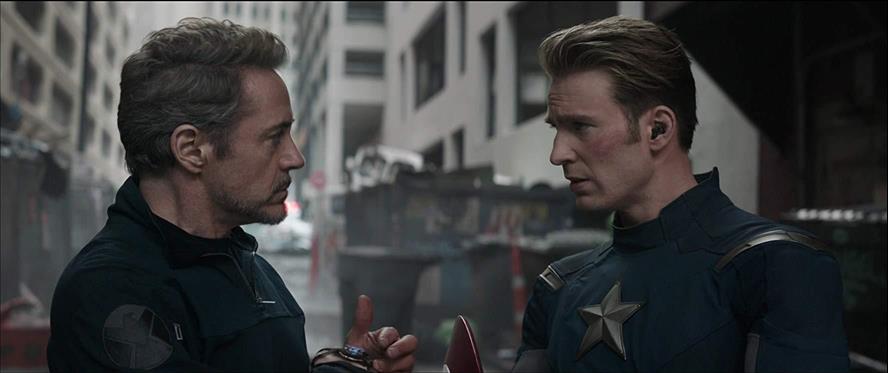
So much earnest. Iron Man and Captain America shake on it. IMDB The comic politic
Perhaps politics? There are certainly political ideas in the Marvel films. Witness state surveillance in Captain America: The Winter Soldier , white colonialism in Black Panther , asylum seekers in Captain Marvel .
And there are countless comic book precedents for this. In Captain America Comics #1 , published in 1941, the superhero socked Hitler in the mouth. Almost 30 years later, in Captain America #122 , he was hesitantly praising hippie peace protesters:
Moving from the texts to their broader contexts, it is also political that some were recently angry at Marvel films with more diverse casts and crews.
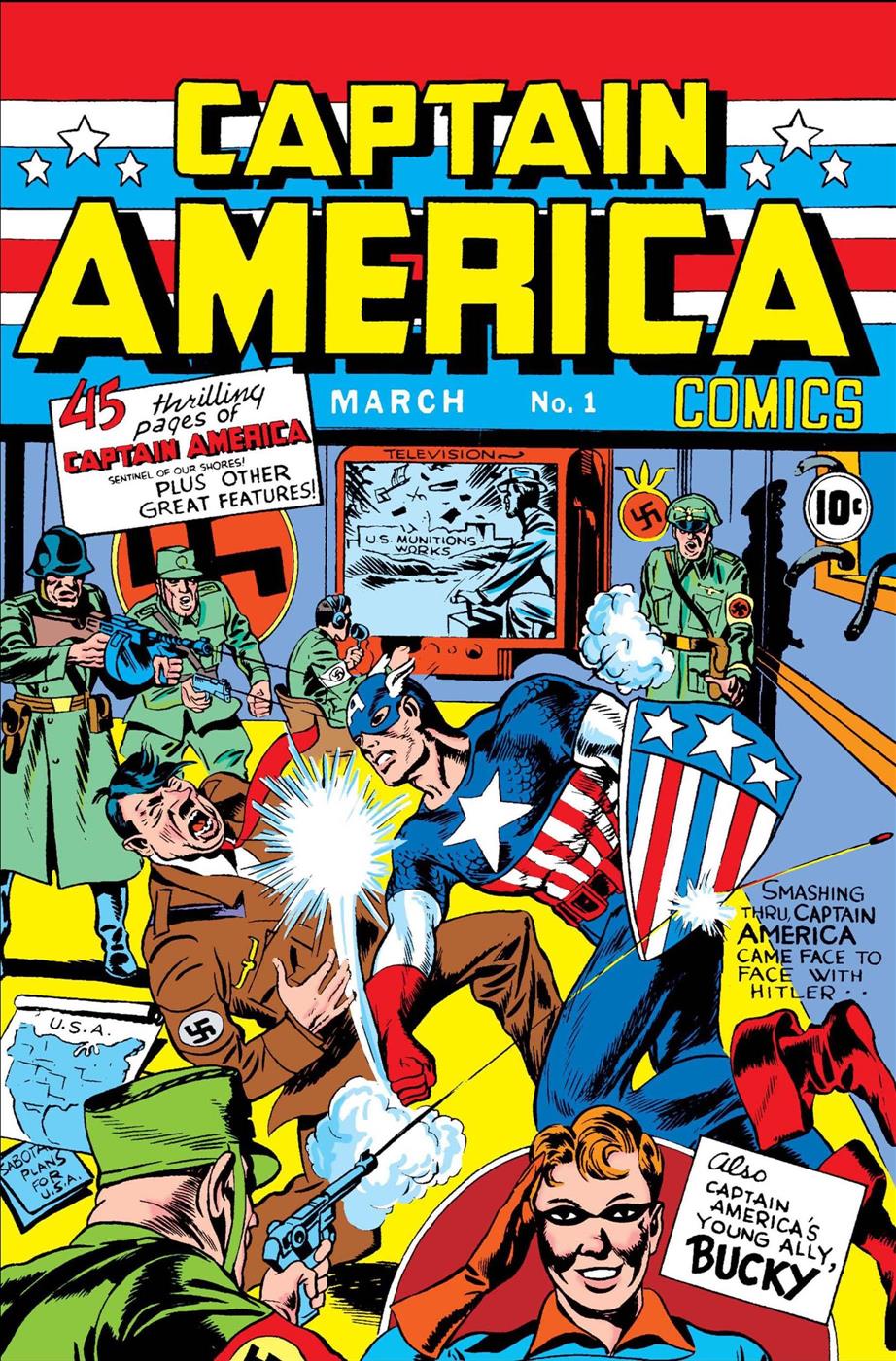
Captain America Comics #1. Marvel The film review aggregator website Rotten Tomatoes, for example, reported a pre-emptive spike in 'non-constructive input, sometimes bordering on trolling' from fans unhappy about Captain Marvel. Similar campaigns were attempted against Black Panther. These were the first Marvel movies featuring female and black solo heroes. Captain Marvel was also co-written and co-directed by women, while Black Panther was written and directed by African-American men.
'It's not difficult to see the common thread,' writes Alex Abad-Santos for Vox, 'that superhero and other franchise movies with woman [sic] and people of colour as protagonists are regularly met by toxic trolling online.' As in Australia and the UK, many white men are furious at small but noticeable challenges to their power.
In short: yes, there are politics in and behind Marvel's tales.
Still, the logic of superhero stories is rarely political, strictly speaking. Politics is about the organisation of society: who we are; who our enemies are; who rules whom; who controls what institutions or resources. Businesses like Marvel are interested in characters thumping or blasting other characters, often while looking beautiful. These fistfights or firefights can symbolise broader and deeper issues – but the symbols are used for close-up entertainment rather than wide-shot social and economic analysis. Captain America summed up this cinematic approach with his own ethos in Captain America: Civil War:
Put another way: the studio's writers have 'faith' in individuals too, and these individuals have yet to let their accountants down.
Alongside this individualism is conservatism. For all their speeches about freedom and justice, these heroes almost always end up punching their way back to the global status quo. They steadfastly avoid what Greek-born French philosopher Cornelius Castoriadis called the 'political imaginary': our power to invent new collective identities and institutions. For Castoriadis, the point is not simply to follow certain laws or parliamentary procedures, the point is to interrogate and reimagine the basic cultural assumptions beneath these. There is very little of this in the Marvel universe, especially the films. As pop culture scholar Noah Berlatsky riffed in an essay for The Verge in early 2019: 'Great power is used to protect the world, not revolutionise it'.
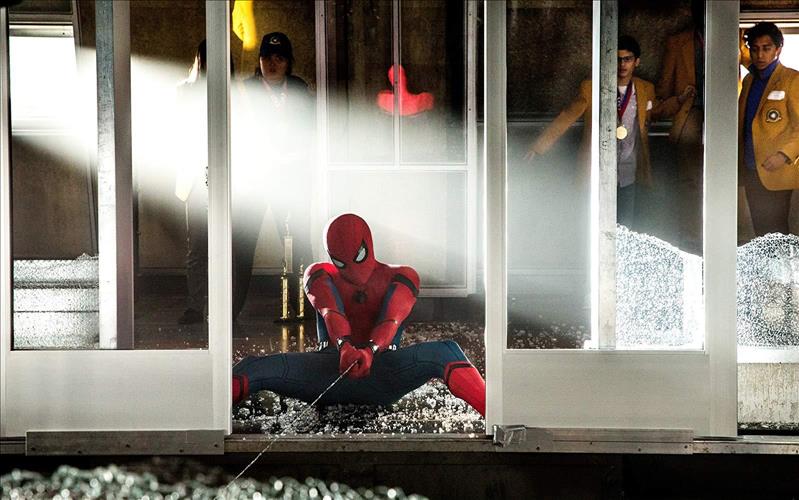
Spider-Man looking typically heroic, a key virtue in the Marvel Cinematic Universe. Marvel Setting high standards
For these reasons and more, the Marvel films are more comfortable with individualistic ethics than with politics proper. Rather than explaining and exploring our collectives, they tend to highlight people's virtues and vices. As philosopher Mark D. White argues in The Virtues of Captain America , characters such as Steve Rogers offer audiences 'moral exemplars'. These might be fictional rather than lived, but they are still portrayed with subtlety, and with surprising fidelity to everyday ambiguity.
This does not mean the superheroes are all perfect Aristotelians. They are rightly flawed characters and – perhaps more importantly – typically very American. 'If Aristotle could somehow have imagined the Captain's mission of giving everyone freedom to live as they choose,' philosopher John Gray observed in The New Republic in April 2014, 'he would undoubtedly have reacted with incredulous contempt'. We turn to Marvel to see virtues dramatised, not exemplified.
The most obvious virtue, common to almost all cinematic heroes, is bravery. In Captain America: The First Avenger , a spindly Steve Rogers demonstrates this by jumping onto a grenade to save burly but cowardly soldiers.
Perseverance is another: witness the same hero in Captain America: Civil War preventing a helicopter taking off simply by holding it. This involves no serious thought or complex negotiations or planning. Captain America simply has to strain and groan and suffer until the job is done.
Alongside these and other classical virtues is the excellence suggested by that handshake between Captain America and Iron Man: trustworthiness.
Trustworthiness is not itself a single virtue, but rather several excellences working together: goodwill, honesty, constancy and the competency to achieve what is promised.
Someone trustworthy can be counted upon to help another who needs it – even if this 'help' is being silent or staying still. They do this not only because they can help, but also because they know they ought to. This ought arises from an ethical readiness rather than from selfishness or friendliness. This is the difference between someone trustworthy and someone merely reliable. The greediest and/or sneakiest can be relied on if they're paid or scared. The truly trustworthy help us not only because their help is necessary, but also because it is in their moral power to do so. They recognise that we are all fundamentally needy, and require others to achieve worthwhile things. 'We are finite dependent social beings,' philosopher Karen Jones writes in Trustworthiness, her 2012 article for Ethics:
So, to trust someone is to have an idea of their character: to believe that they are able and willing to assist us, because we need assistance. And part of being trustworthy, in turn, is showing others that they can trust us; that we can be relied on – if not right now, then when it counts. There is a mirroring of minds here. Each of us needs the ability to imagine the other's state of mind – and to imagine the other imagining us.
Importantly, we can be wrong about trustworthiness, and this is one of trust's defining characteristics: we are taking a risk when we exercise it. Put another way, trust is a profoundly mortal achievement. Omnipotent and omniscient gods need no trust between them, since they are never helpless, and always know the souls of others.
To err is human
There are few true divinities like this in the Marvel universe, since all-powerful and all-knowing beings make for dull drama. Even Galactus, the fabulously purple planet eater who first appeared in Fantastic Four #48 , has need of minions and allies.
Our earnest handshaker, Captain America, is also the trusted Marvel persona. Well-meaning, sincere, forthright and somewhat transparent in his moral simplicity, Steve Rogers can be counted upon when it matters. This is perhaps his defining characteristic: whatever happens, he will be there for his friends, allies and the world.
This is why Tony Stark's sickbed rejection of Captain America in Avengers: Endgame is so powerful. Haggard and slurring his words on tottering legs, Tony returns from being stranded in space to accuse Rogers of failing him personally. 'I got nothing for you, Cap,' he says. 'No clues, no strategies, no options. Zero, zip, nada. No trust, liar.'
The point of this is not that Iron Man is correct or that Captain America is a capricious and deceptive man-child in a flag suit; the point is that Tony is beaten and weak and a little mad, and this is why he doubts his comrade's integrity. As soon as the entrepreneur is well again, his trust in Steve Rogers returns. Iron Man thinks the great American hero is simple, naive and smug – but always worthy of trust.
This dramatisation of trust continues throughout the Marvel Cinematic Universe. Should Captain America trust Thor's brother, Loki? (Probably not.) Should he trust Bucky Barnes, though his old partner has become a brainwashed cyborg assassin? (Yes.) Should he trust former spy Natasha Romanova, the Black Widow? (Yes.) Should anyone trust Nick Fury? (No. The spymaster is reliable, but not trustworthy.)
As these examples suggest, Captain America is not only trustworthy, but is also trusting in return. He is not afraid to ask for help, and thereby to demonstrate that someone is more trustworthy than they seem – even to themselves. As Karen Jones phrases it:
In the Marvel Cinematic Universe, Steve Rogers is the personification of hopeful trust: he allows characters to believe in mutual, mature goodwill.
Likewise for the comics. What distinguishes Captain America from other super-soldiers is that this often lonely professional hero is surprisingly vulnerable. He might be quaint and a bit staid, but he will risk his life for trust. In Mark Millar's Civil War, Steve Rogers ends his fight with Iron Man by turning himself in. 'We're not fighting for the people any more,' he says, weeping. 'We're just fighting.' Knowing the dangers, he allows himself to be handcuffed, jailed and put on trial by the authorities. If he is suspicious of institutions, he believes in good individuals. Captain America is then shot on the steps of the New York federal courthouse: his trust in his fellow citizens leaves him bleeding.
And this is only one storyline in one superhero series – Marvel has the rights to some 7,000 characters. Almost all of their storylines involve trust and its betrayal.
A dedicated fan exploration of the Marvel Cinematic Universe. Lessons for young players
Because of these ethical dramas, I am comfortable with my children watching Marvel films. (I say 'comfortable' as if I'm a serious and aloof philosopher, and not a grown man with his own Punisher action figure.) While their political message is often a soufflé of puffy fascism inside a liberal crust, their moral drama is instructive. Over the dinner or café table, I have asked our kids about Iron Man's instrumental rationality, Captain America's dogmatism, Thanos's Malthusianism, Captain Marvel's glorified militarism.
As a public philosopher, I have taken these kinds of puzzles into schools. The pupils might not be familiar with Aristotle's theory of the virtues, but from Spider-Man: Homecoming , they are familiar enough with Flash Thompson, Iron Man and Spider-Man to recognise the philosopher's tripartite scheme of courage, bravery and foolhardiness.
And trust has been a large part of these conversations. Trust is especially fraught for children. Kids are more powerless than adults and require more help to realise their needs. They are also more vulnerable to trickery and coercion, so they often trust the wrong people – those who suggest they can be counted on, but who are actually capricious or malicious. Children need to tell the difference between Thor's well-meaning bluster and Loki's smiling malice in Thor; between Talos's evasions and Yon-Rogg's manipulations in Captain Marvel; between Iron Man the altruistic amateur soldier in Iron Man and Iron Man the manic narcissistic technocrat in Captain America: Civil War.
This answers one of the questions of parenthood: with what or whom can I leave my children alone? Our kids can watch Marvel films whenever they like. These movies might be glib, cynical or boring – but as moral dramas, they are benign.
But do I trust Marvel? Shit, no. (Apologies to Captain America for the 'language'.)
To begin, the company is constantly trying to sell me and my children stuff. Picture the ultimate Marvel brand manager's fantasy: me driving to the supermarket in my Avengers: Endgame product-placement Audi, wearing my Avengers tie and cologne. The kids munch on their Spider-Man fruit snacks, and sip on their Spider-Man water bottles – all purchased with my Marvel Mastercard. At home, I cook snacks in my Avengers waffle maker, then we all watch Spider-Man: Homecoming before sleeping under our Guardians of the Galaxy bed linen.
The important thing, for Marvel, is to make sure that each product continually advertises another Marvel product. In this corporate universe, films spruik merchandise that spruiks television shows that spruik tie-ins, and so on.
Marvel's industrial relations record is also worrying. They are now owned by Disney, hardly a corporate superhero. While profits have risen, wages at Disneyland have actually fallen in real terms. According to a Los Angeles Times story from 2018, a survey of the Anaheim theme park's workers found that 'three-quarters say they can't afford basic expenses every month'.
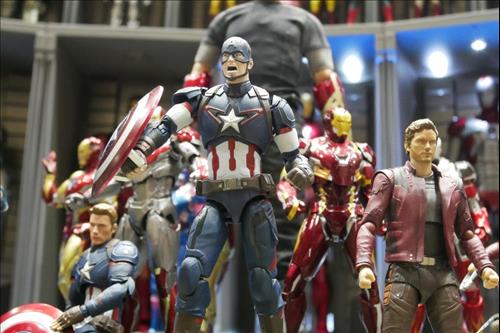
Marvel at the array of action figures. Shutterstock As Sean Howe details in Marvel Comics: The Untold Story , Marvel comics itself was also notorious for exploiting freelancers. Despite their works selling millions of copies, authors and illustrators were paid page rates and nothing more. The vast Marvel Cinematic Universe was built by low-waged, precarious labour. Put simply: it is naive to believe a superhero business is anything other than a business. There are certainly more exploitative firms in the world, but this does nothing to make Marvel trustworthy.
In fact, nothing can make Marvel trustworthy. Not because it is evil, but because it is a corporation, and the notion of 'trust' does not apply. Corporations are often treated as individuals in law, but they are not individuals as we are. They can be governed more or less ethically; can work for or against the common good; can be regulated to minimise harm or deregulated to maximise profit. They can, in other words, be guided or coerced politically. But they are not ethical persons, with whom we can develop trustworthy relationships.
Think of how it feels to pledge yourself to someone; to show that you understand that they are in need of help, and what this means as a finite dependent social being; to demonstrate – or hope to – that you are helping because help is simply necessary, and not because of anger, fear or greed. A corporation cannot think of how this feels, because it is not able to think of someone at all. It lacks what philosophers call a theory of mind: the ability to imagine the mental states of others, and to imagine them imagining us. There can be no mirroring of minds here, because a corporation is neither conscious of itself, nor conscious of anyone else. It is not an immature or immoral person. It is not a person at all – and it is a 'category mistake' to think otherwise, as philosopher Matthew Lambert observes. Put another way: Marvel will never respond to Captain America the way I have – it cares nothing whatsoever for his moral ideals, because it has literally no conception whatsoever of morality itself.
The story of us
As I suggested earlier, I grant that Marvel's stories might be discussed ethically and politically. In fact, this kind of conversation is required by Castoriadis's 'political imaginary'. As a community, our revised conceptions of 'us' cannot be legislated by representatives, nor outsourced to experts – they must arise from our negotiations. And they involve not only formal politics, but also art. As Castoriadis argues in The Greek Polis and the Creation of Democracy, tragedy enabled the Athenians to witness and debate their own partial values and ideals; to confront the ambiguous and fickle nature of political action.
Sophocles's Antigone , for example, revealed that 'nothing can guarantee a priori the correctness of action – not even reason'. There is a similar mood to Marvel's Civil War stories: the violent confrontation of good against good, in which pious duty or technocratic certainty are equally destructive. This is hardly Antigone, but it is occasionally poignant, and certainly stirring.
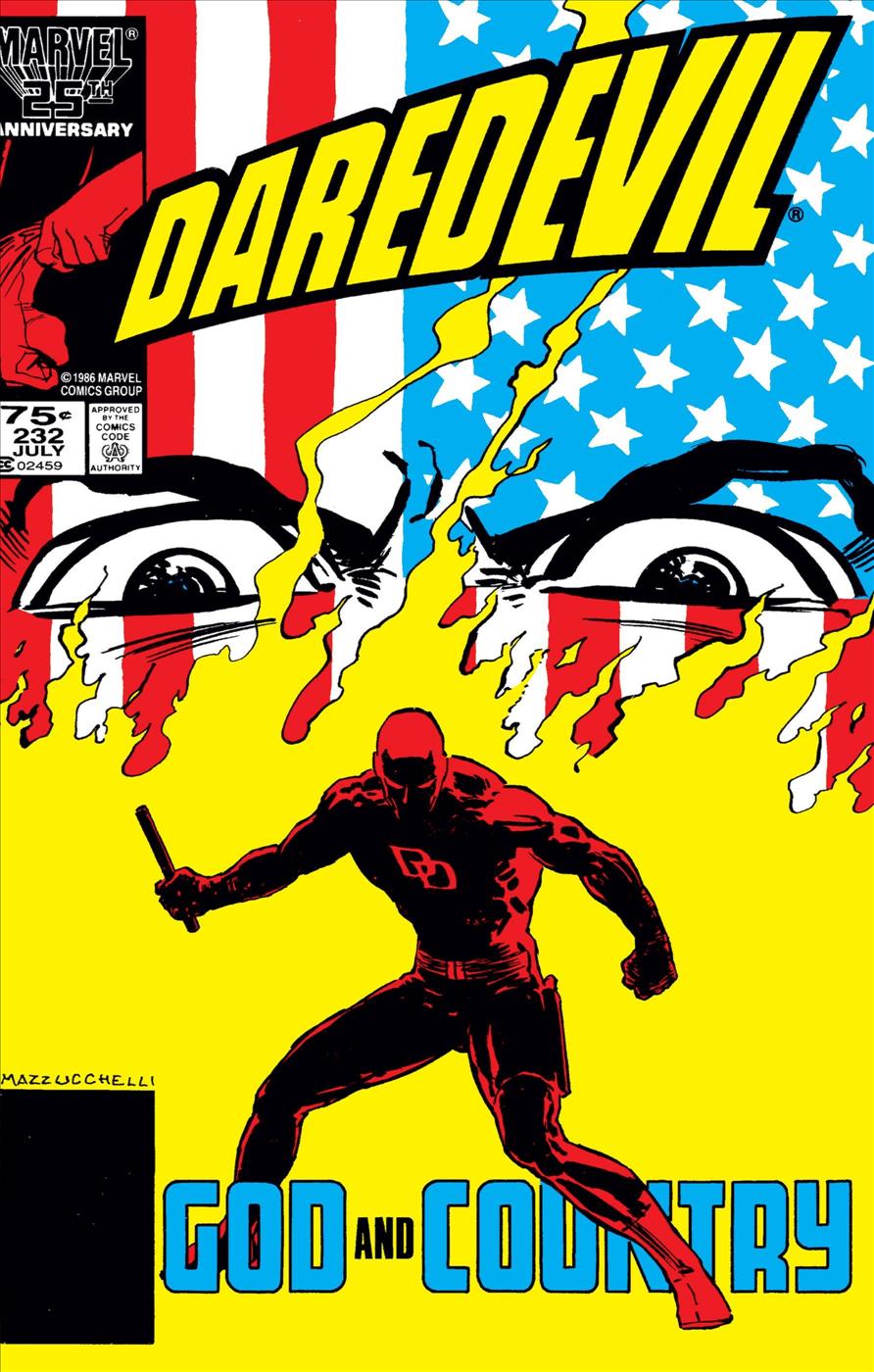
Daredevil #232. Marvel Superheroes also provide familiar ideals for us to seek. And there is an Athenian precedent for this, too – though by no means democratic. Plato's utopia in The Republic was modelled after Socrates's beautiful soul, and the Marvel superheroes offer similar existential symbols. They are political and moral forces, encapsulated in selves. Captain America alone can be a potent sign of freedom or fascistic tyranny, of rebellion or nationalistic obedience, of solitary obsession or charismatic esprit de corps. We can explore rage in Wolverine, the trauma of marginalisation in X-Men, seductive nihilism in the Punisher, faith in Daredevil and so on. While these stories typically lack genuinely political thought, they can offer emblems of personal striving, and provide memorable celebrations or warnings.
One such warning is offered by the criminal Kingpin in Frank Miller and David Mazzucchelli's Daredevil #232 . As he manipulates a crazed super-soldier, Nuke, into attacking his enemies, the Kingpin reveals the very ordinary reasons for violence: profit. While his greed is gussied up in the star-spangled banner for Nuke's sake, this is about business. Hindered by regulation, Kingpin must break the law. 'I am not a villain, my son. I am a corporation.' There will be no reform, no rehabilitation. This is who the Kingpin is, and always will be.
While simplistic, this message resonates with me. For all the earnest speeches and handshakes, Marvel the business will never gain my trust. But it will also never betray me. More likely it will just disappoint me, until I am too exhausted or exasperated for disappointment. Either way, I ought to look elsewhere for the virtues advertised in the Avengers films.
I leave my kids with Marvel not because I trust the corporation, but because I trust my children.
This piece is republished with permission from GriffithReview67: Matters of Trust (Text), ed Ashley Hay
- Ancient Greece
- Marvel
- Moral philosophy
- moral virtues
- Friday essay
- Virtue ethics
- Marvel Comics
- Marvel films
MENAFN0602202001990000ID1099665224